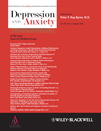SEROTONIN TRANSPORTER LENGTH POLYMORPHISM, CHILDHOOD MALTREATMENT, AND CHRONIC DEPRESSION: A SPECIFIC GENE–ENVIRONMENT INTERACTION
Contract grant sponsor: The Medical Research Council, UK, and the Wellcome Trust funded the sample collection. Depression and Anxiety 00:1-9, 2012. © 2012 Wiley Periodicals, Inc
Abstract
Background
Key questions about the interaction between the serotonin transporter length polymorphism (5-HTTLPR) and stress in the etiology of depression remain unresolved.
We test the hypotheses that the interaction is restricted to childhood maltreatment (as opposed to stressful events in adulthood), and leads to chronic depressive episodes (as opposed to any onset of depression), using gold-standard assessments of childhood maltreatment, severe life events, chronic depression, and new depressive onsets.
Method
In a risk-enriched sample of 273 unrelated women, childhood maltreatment was retrospectively assessed with the Childhood Experience of Care and Abuse (CECA) interview and 5-HTTLPR was genotyped. A subset of 220 women was followed prospectively for 12 months with life events assessed with the Life Events and Difficulties (LEDS) interview. Any chronic episode of depression (12 months or longer) during adulthood and onset of a major depressive episode during a 12-month follow-up were established with the Schedules for Clinical Assessment in Neuropsychiatry (SCAN) interview.
Results
The short alleles of 5-HTTLPR moderated the relationship between childhood maltreatment and chronic depression in adulthood, reflected in a significant gene–environment interaction (RD = 0.226, 95% CI: 0.076–0.376, P = .0032). 5-HTTLPR did not moderate the effects of either childhood maltreatment or severe life events on new depressive onsets.
Conclusions
The short variant of the serotonin transporter gene specifically sensitizes to the effect of early-life experience of abuse or neglect on whether an adult depressive episode takes a chronic course. This interaction may be responsible for a substantial proportion of cases of chronic depression in the general population. Depression and Anxiety 00:1-9, 2012. © 2012 Wiley Periodicals, Inc.




